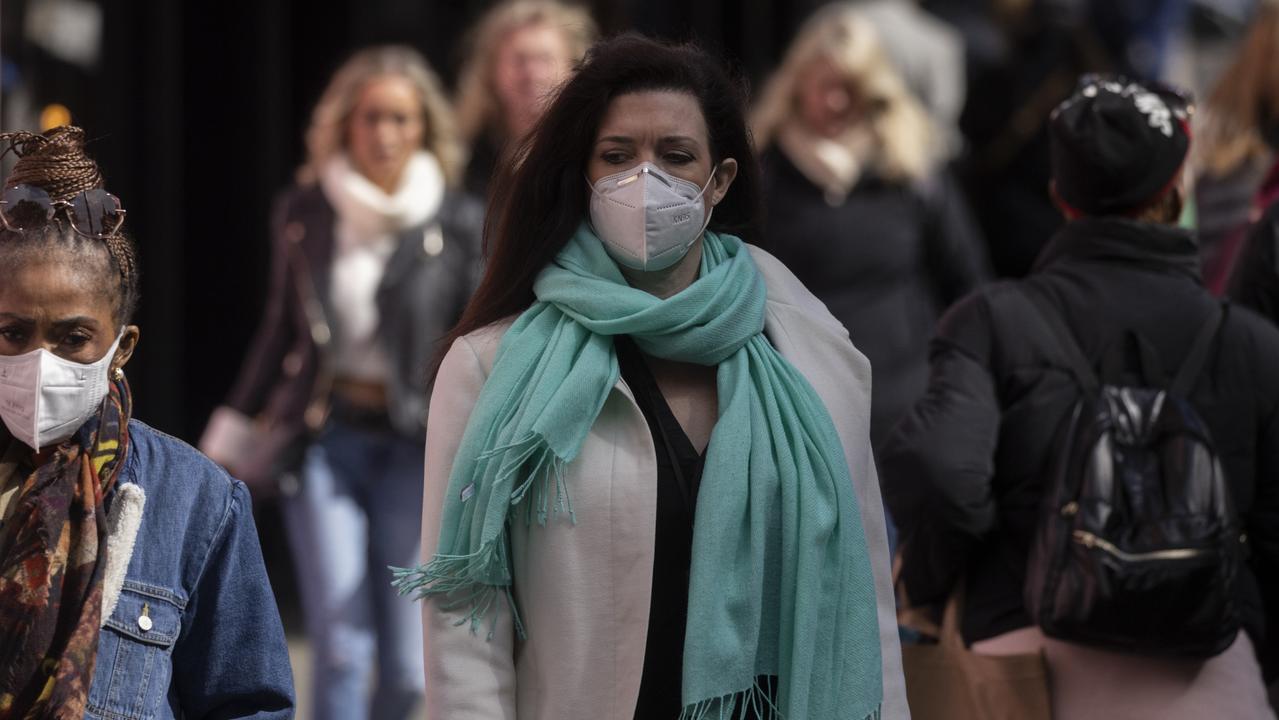Europe upgrades Omicron strains BA. 4 and BA. 5 to ‘variants of concern’
Europe has raised the alarm over two new offshoots of Omicron, upgrading both to “variants of concern” amid fears of a Covid “summer wave”.

Europe has raised the alarm over two new offshoots of the Omicron variant, upgrading both to variants of concern amid fears of a “summer wave”.
The European Centre for Disease Prevention and Control (ECDC) announced overnight the change in its classification of Omicron sub-lineages BA. 4 and BA. 5 — which were first detected in South Africa in January and February respectively — making it the first public health authority to do so.
In a report, the ECDC said that both strains could lead to an uptick in cases across the continent, risking a surge in pressure on both hospital and intensive care capacity.
While there’s been “no indication” that the variants are any more severe than previous iterations of Omicron, they have fast become the dominant strains in South Africa, and BA. 5 is expected to do the same in Portugal by May 22, according to the ECDC.
The Portuguese National Institute of Health estimated last week that BA. 5 already accounted for 37 per cent of all positive cases.
“The presence of these variants could cause a significant overall increase in Covid-19 cases in the EU/EEA in the coming weeks and months,” it added, noting the estimated daily growth advantage of BA. 5 over BA. 2 is 12 per cent.


“The overall proportion of BA. 4 and BA. 5 in the EU/EEA is currently low but the high growth advantages reported suggest that these variants will become dominant in the EU/EEA in the coming months.
“Based on the limited data currently available, no significant increase in infection severity compared to the circulating lineages BA. 1 and BA. 2 is expected.
“However, as in previous waves, if Covid-19 case numbers increase substantially, some level of increased hospital and ICU admissions is likely to follow.
“ECDC encourages countries to remain vigilant for signals of BA. 4 and BA. 5 emergence.”
It also urged people of “all age groups” to take up the primary and booster courses of the Covid-19 vaccine, which could help protect against the new strains if their immunity has “waned over time”.

“If such signals emerge, a second booster may be considered for some or all adults 60 years and older and for other vulnerable groups,” the ECDC said.
“Countries should have plans in place for the rapid deployment of booster doses in these population groups.”
It comes after Covid-19 researchers told Fortune the variants had been identified in multiple US states at the end of April, though Johns Hopkins virologist Andy Pekosz it wasn’t “clear precisely how widely” it had spread.
“Both have some mutations … that are of particular concern because they are linked to increased transmission, but immunity from BA. 1 or BA. 2 infection should still recognise these variants, so I would not expect a surge that rivalled what we saw with BA. 1,” he explained.
The growth advantage of Omicron BA.4 and BA.5 over BA.2 and BA.1 is 0.08 and 0.12 per day @C_Althaus and a little bit higher by @TWenseleers (whom I would like to apologize for criticizing Twitter & hope he can work with us to better characterize new SA lineages). pic.twitter.com/XGHYEvAh4u
— Tulio de Oliveira (@Tuliodna) April 29, 2022
But South African Covid-19 expert Tulio de Oliveria disagreed, telling Bloomberg that the variants have “mutations in the lineages that allow the virus to evade immunity”.
“We expect that it can cause reinfections and it can break through some vaccines, because that’s the only way something can grow in South Africa, where we estimate that more than 90 per cent of the population has a level of immune protection,” he said.
He added on Twitter that “previous infections with Omicron BA. 1 will not be sufficient to prevent a second infection with BA. 4 and BA. 5”.
“We are all tired of this virus, but he may not be tired of us,” he wrote.
“We need now to take seriously the decreasing immunity from previous infections and … show that vaccination is much more reliable to maintain immunity than only infection.”






